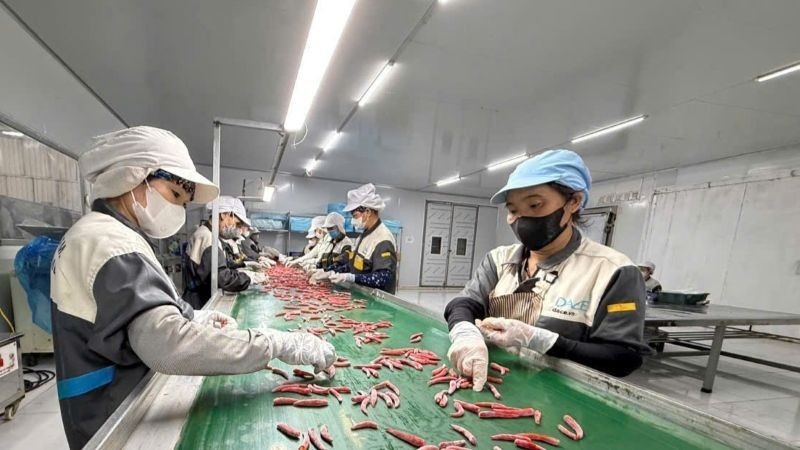Making the private sector the most important driver of the Vietnamese economy
After nearly 40 years of reform, Viet Nam’s private sector has made remarkable progress in both scale and quality, steadily affirming its role in the socialist-oriented market economy. However, the sector still faces shortcomings that must be addressed swiftly to become a pillar of national economic development.

In Resolution 68, issued in May 2025, the Party Central Committee made clear that the private sector is one of the most important drivers of the national economy.
The resolution sets the goal of developing the private sector into a pioneering force in science and technology, innovation and digital transformation, thereby contributing significantly to the successful implementation of Resolution 57 issued in December 2024 on national science and technology, innovation and digital transformation, as well as other key Party resolutions such as Resolution 59 on economic integration in the new context and Resolution 66 on law-making and enforcement in the new era.
Together, these resolutions constitute four vital pillars to guide the country into a new stage of development.
In 2024, the private sector accounted for 53.4% of total social investment capital, 82.07% of total employment, 38.6% of pre-tax profit, and 51% of employee income within the enterprise sector.
Notably, it contributed 43% of total GDP and as much as 57% of GDP growth, the highest among all economic sectors. On average, from 2011 to 2024, the sector achieved an annual growth rate of 6.3%, higher than the national average of 5.48%.
These figures underscore the private sector’s central role and enormous potential, laying the foundation for elevating it into the main driver of Viet Nam’s rapid and sustainable growth.
Resolution 68 also sets specific goals to 2030 with a vision to 2045, including having 2 million active enterprises (equivalent to 20 per 1,000 people), contributing around 55-58% of GDP and 35-40% of total state budget revenue, creating jobs for 84-85% of the labour force, achieving average labour productivity growth of 8.5-9.5% per year, and ensuring at least 20 major private enterprises join global value chains. By 2045, Viet Nam aims to have at least 3 million enterprises, with the private sector contributing over 60% of GDP and becoming a highly competitive force regionally and globally.
Nevertheless, relative to its expected role as a national economic pillar, the private sector continues to face major challenges. At present, it is the sector with the lowest business efficiency, technological capacity, labour productivity and employee income among all components of the economy. Moreover, the private sector is showing signs of losing momentum.
According to Professor To Trung Thanh, Head of the Science Management Department at the National Economics University, these challenges stem from several bottlenecks: insufficient recognition of the private sector’s role; institutions and policies that remain uneven and non-inclusive; lack of effective models for linkages among private-sector components; weak internal capacity and limited ability to mobilise development resources; and shortcomings in the quality of the business community.
He added that these bottlenecks must be clearly recognised and resolved in a timely manner with breakthrough solutions, so that the private sector can develop substantively and truly become the most important driver of economic growth in the new phase.

Nguyen Thanh Hieu, Vice President of the National Economics University, said the university seeks to collaborate with domestic and international experts to shape directions and policy recommendations that will accompany the private sector on its journey to becoming the foremost driver of the national economy.
Tran Xuan Luong, Deputy Director of the Viet Nam Real Estate Market Assessment Institute, noted that eliminating land-related obstacles for small and medium-sized enterprises (SMEs) is essential for the successful implementation of Resolution 68. Moving towards post-checks, establishing clear standards and regulations, granting enterprises greater autonomy, streamlining procedures and ensuring transparency will create a fair and efficient business environment, thereby enhancing national competitiveness.
Luong stressed that this is one of the key bottlenecks that must be addressed in order to foster an effective private-sector development process, enabling it to truly become the most important driver of the economy.
Statistics from the Ministry of Planning and Investment (now the Ministry of Finance) show that SMEs play a central role in Viet Nam’s economy. In 2024 alone, they contributed around 45% of GDP and created more than 60% of jobs. Access to land is a prerequisite for this sector to expand production, upgrade technology and participate more deeply in global value chains.
Thus, it is necessary to shift from pre-checks to post-checks, establish a national system of standards and regulations for construction, infrastructure, capital and environment, while streamlining administrative procedures to reduce time and costs for enterprises.
Professor Hieu affirmed that it is essential to identify the current bottlenecks in private-sector development, and then propose breakthrough solutions to strengthen its role as the foremost driver of the economy, thereby contributing to rapid and sustainable growth.








